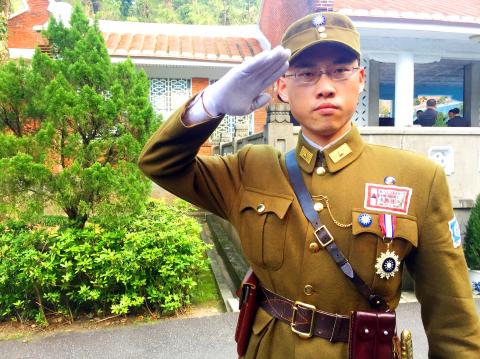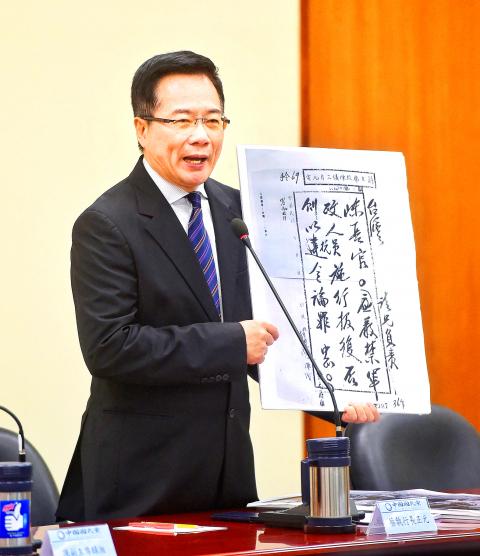Chiang Kai-shek (蔣介石) was a “respected veteran” who put Taiwan’s security ahead of his goals, Chinese Nationalist Party (KMT) Central Policy director Alex Tsai (蔡正元) said yesterday, adding that all KMT members must be required to recite this “standard” response to questions about the former president’s role in the 228 Incident.
Tsai hosted a KMT news conference to address criticism by pan-green politicians and their supporters who say Chiang, who died 42 years ago yesterday, was the mastermind of the 228 Incident.
After the 228 Incident erupted in 1947, militia occupied public agencies — including airports, city governments, schools and hospitals — prompting Chiang, the national leader at the time, to deploy troops to Taiwan in a last-ditch effort to quash the insurgency, just like any head of state would, Tsai said.

Photo: CNA
“If [Kaohsiung Mayor] Chen Chu (陳菊) were kidnapped by a militia, it would be impossible for Taipei-based President Tsai Ing-wen (蔡英文) to sit idly by and not send any troops to quash the militia in Kaohsiung,” Alex Tsai said.
Then-Taiwan governor Chen Yi’s (陳儀) governance gave rise to the 228 Incident and Chiang, concerned that the conflict between KMT troops and the masses would escalate, sent Chen a telegram urging him to make sure that the troops did not take retaliatory action or they would be charged with treason, Alex Tsai said.
The telegram indicated that Chiang’s sole intention in sending the troops was to suppress the insurgents and although any skirmish would inevitably cause collateral damage, the death toll was insignificant compared with that during the revolt against Japanese rule when Taiwan was ceded to Japan, he said.

Photo: Fang Pin-chao, Taipei Times
Considering this and the fact that Chiang was at the time preoccupied with forming a strategy to counter the Chinese Communist Party forces gathered in China’s Yanan City, it is evident that the pan-green camp’s accusations that Chiang was a “murderer” responsible for the 228 Incident was unfair and slanderous, he said.
Chiang’s leadership was also instrumental to the then-KMT government’s victory over the People’s Liberation Army in the 1949 Battle of Kuningtou and the 823 Artillery Bombardment in 1958, without which Kinmen County would have been lost and Taiwan would have fallen under Chinese communist rule, he said.
Alex Tsai said the least any KMT member wanting to run for office in the party can do is to defend Chiang when Chiang is criticized.
“They should not distance themselves from Chiang just to pander to Taiwanese independence advocates or bereaved families of the 228 Incident,” he said.
Asked by reporters whether his remarks were directed at former president Ma Ying-jeou (馬英九), who on Feb. 27, in response to reporters’ questions, said that Chiang “had a responsibility” in the 228 Incident, Alex Tsai said that Ma had not given the question careful thought and gave an “unfair” reply.
“Therefore, we would like to issue a special notice to all KMT members who hold or have held positions in the party to adhere to the standard response: ‘Chiang Kai-shek is not the murderer in the 228 Incident, but a leading warrior and veteran who protected Taiwan,’” he said.
“This is the standard answer the party wishes to establish today. Anyone who diverts from this answer does not deserve to serve as a KMT employee or official,” he said.
Separately yesterday, former vice president Wu Den-yih (吳敦義), who is running in next month’s KMT chairpersonship race, said that without Chiang’s dedication to the Republic of China, Taiwan would still be occupied by the Japanese instead of being governed by Tsai Ing-wen today.
Although Chiang was not perfect, his role in the 228 Incident should be evaluated in a fair and just manner, Wu said.
KMT Chairwoman Hung Hsiu-chu (洪秀柱) said the Democratic Progressive Party’s plan to remove remnants of Chiang’s rule is aimed at severing Taiwanese people’s emotional ties to Beijing and fulfilling its dream of independence.

CARROT AND STICK: While unrelenting in its military threats, China attracted nearly 40,000 Taiwanese to over 400 business events last year Nearly 40,000 Taiwanese last year joined industry events in China, such as conferences and trade fairs, supported by the Chinese government, a study showed yesterday, as Beijing ramps up a charm offensive toward Taipei alongside military pressure. China has long taken a carrot-and-stick approach to Taiwan, threatening it with the prospect of military action while reaching out to those it believes are amenable to Beijing’s point of view. Taiwanese security officials are wary of what they see as Beijing’s influence campaigns to sway public opinion after Taipei and Beijing gradually resumed travel links halted by the COVID-19 pandemic, but the scale of

TRADE: A mandatory declaration of origin for manufactured goods bound for the US is to take effect on May 7 to block China from exploiting Taiwan’s trade channels All products manufactured in Taiwan and exported to the US must include a signed declaration of origin starting on May 7, the Bureau of Foreign Trade announced yesterday. US President Donald Trump on April 2 imposed a 32 percent tariff on imports from Taiwan, but one week later announced a 90-day pause on its implementation. However, a universal 10 percent tariff was immediately applied to most imports from around the world. On April 12, the Trump administration further exempted computers, smartphones and semiconductors from the new tariffs. In response, President William Lai’s (賴清德) administration has introduced a series of countermeasures to support affected

Pope Francis is be laid to rest on Saturday after lying in state for three days in St Peter’s Basilica, where the faithful are expected to flock to pay their respects to history’s first Latin American pontiff. The cardinals met yesterday in the Vatican’s synod hall to chart the next steps before a conclave begins to choose Francis’ successor, as condolences poured in from around the world. According to current norms, the conclave must begin between May 5 and 10. The cardinals set the funeral for Saturday at 10am in St Peter’s Square, to be celebrated by the dean of the College

CROSS-STRAIT: The vast majority of Taiwanese support maintaining the ‘status quo,’ while concern is rising about Beijing’s influence operations More than eight out of 10 Taiwanese reject Beijing’s “one country, two systems” framework for cross-strait relations, according to a survey released by the Mainland Affairs Council (MAC) on Thursday. The MAC’s latest quarterly survey found that 84.4 percent of respondents opposed Beijing’s “one country, two systems” formula for handling cross-strait relations — a figure consistent with past polling. Over the past three years, opposition to the framework has remained high, ranging from a low of 83.6 percent in April 2023 to a peak of 89.6 percent in April last year. In the most recent poll, 82.5 percent also rejected China’s